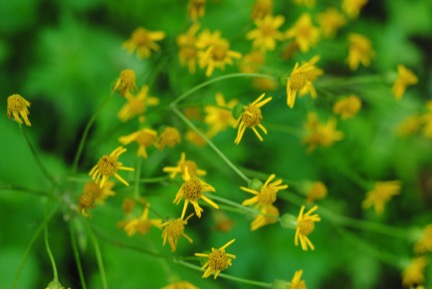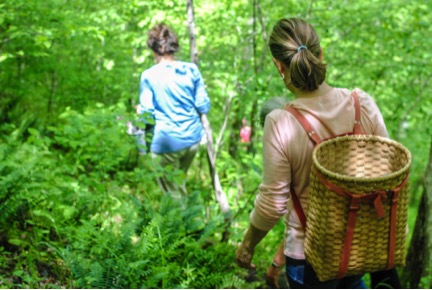I follow her into the forest. Teresa descends a narrow, earthen path into the lush foliage surrounding the apothecary grounds. She reaches towards a nearby pine. From the tip of the branch, where the mature and deep emerald needles end, Teresa plucks a batch of soft, youthful and vibrantly light green ones. To my surprise she places them into her mouth and, in her gentle Southern drawl, begins to glorify their pleasant taste and extraordinary health properties. Sort of citrus-y… and full of Vitamin C, just like an orange. She tells me. If you were starving in the woods, you could survive on these alone.
As I gather a similar collection of budding pine and place it in my mouth, I relish the familiar taste of citrus astringency, the similar antiseptic quality of orange pith. The texture is waxy like a succulent plant and the inside is no softer than a very thin mung bean sprout might be. For the rest of the day I run back and forth between the apothecary and my favorite patch of pines. Another student laughs at my newfound addiction. At least it’s a healthy one.
Teresa and I spend many moments walking through the woods identifying wild, native herbs and nibbling on hidden superfoods like stinging nettle seeds. I am inspired by her sense of knowing and connectedness with the living scenery. But most of all, I admire her constant acknowledgement of herbs, plants, and other living organisms as divine emanations for us to learn from. To me, her relationship with the forest is captivating and reminds me of a passage from Vedic Ecology through during which Indian Environmentalist Pancavati Banwari is quoted as emphasizing our inherent unity with the forest.
[We] are also a part of that forest. It is not that [we] are outside the forest. In India, the world is mahavan [or the great natural forest where all species of life find shelter]—[we] can reorder it, but [we] cannot be outside it.” (Prime)
As I acknowledge my inherent connection to all of life, I begin to cultivate a deeper sense of responsibility and stewardship than I ever found through Environmental Science lectures or textbook readings. The direct experience that the very plants that grow outside my window can nourish and sustain me becomes the platform off of which I cultivate reverence and prayer for the artist behind the scenery.

7 But ask the animals, and they will teach you, or the birds in the sky, and they will tell you;
8 or speak to the earth, and it will teach you, or let the fish in the sea inform you.
9 Which of all these does not know that the hand of the LORD has done this?
10 In his hand is the life of every creature and the breath of all mankind. (Job 12:7-10)

